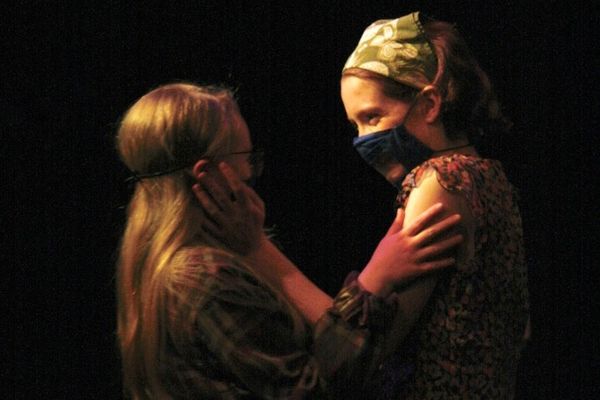After many monotonous months of online events, only something spectacular could convince people to watch another streamed performance. Furman student Clare Beth McConnel’s (‘21) original production Exit 7 is certainly up to the challenge.
Exit 7 follows the life of two childhood friends as they progress through high school, college and beyond. The viewer watches as the girls struggle with calling, popularity, identity and love in a heartwarming and realistic manner. Divulging her intentions behind this play, McConnel said, “Over the course of this coming-of-age story, the audience sees the characters’ universes grow along with the wisdom to know how they fit into them as individuals.” McConnel has certainly achieved this goal; by the end of the play, each character feels familiar and relatable to the viewer.
Exit 7 is thoughtful, vulnerable and grounded. References to childhood favorites like Harry Potter and The Phantom Tollbooth will surely make the audience smile,; and the more intense moments are remindful of what it is like to struggle with the difficult process of growing up. While the play contains only a few set pieces and two actors, its story it is complex–capturing both whimsy and depth.
Despite its current virtual capacity, Exit 7 was originally intended to be performed in a live theater. McConnel had been working on the play’s script since December 2019 and was set to premier the show in DC, at the Capital Fringe Festival, during the summer of 2020. Due to the pandemic, the performance was delayed and moved online, meaning that the entire cast and crew had to work extra hard to create a production that could be recorded on camera. McConnel noted that certain elements were particularly difficult to translate from theater to screen — the “lighting designer in particular had to adjust his designs to accommodate the camera.”
Yet, as an audience member, these difficulties went unnoticed. In fact, the lighting appeared concentrated and specific. I particularly liked the illumination effects given off by some of the lanterns that the actors hold as the shadows and contrasts create a more intimate setting on stage.
Sound effects also had to be optimized because of the new format of the show. To help relay feelings of intimacy to the audience, Dennis Cheeks (‘22, sound designer) used certain sound effects to mark important places in the story and build the relationship between the two characters. Intentional lighting, a limited space, and reoccurring sound elements all came together to make up for the challenges of an online platform.
Technical details were not the only things affected by the pandemic — all cast and crew members had to comply with COVID-19 safety measures and guidelines. Given that McConnel’s play is a deeply personal production, one of the biggest challenges was achieving intimacy without prolonged physical contact. The cast used clear masks so that viewers could see as much of their faces as possible; I thought that scenes worked well with the necessary space between actors. However, building an on-stage relationship without a lot of physical touch was not easy — McConnel reflected that “all of the Covid protocols presented challenges. But we did our best to create art in a pandemic while keeping everyone safe.”
Though the final setting was not expected from the onset, the production really came together. Yet nothing can truly replace live theater — the atmosphere and feeling is incomparable. McConnel perfectly articulates this sentiment, saying “we all very much look forward to the day when we can do this show for a live, gathered audience.”
If you would like to watch Exit 7 for yourself and preview some amazing Furman talent while you are at it, check out the production here.
